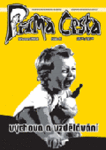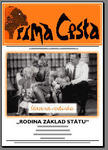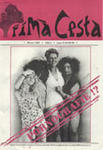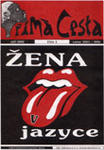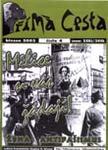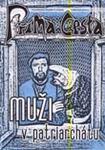Přímá cesta (zine, 2001-2006)
type=digital_archives
Info:
Přímá cesta ("The Direct Way") was a zine published by the Czech anarcha-feminist group Anarchofeministická skupina between 2001 and 2006 (8 issues); each issue is based on a specific topic; emphasis on anarcha-feminist history/theory/activism, globalisation/economic alternatives/anarchism, family/parenting, language/media, antifascism, patriarchy, pornography, sexuality/LGBTIQ, violence/women in conflict, book/zine reviews/literature, culture/film/music, translations of theoretical texts (mostly about anarcha-feminism) etc. Almost all issues can get downloaded from their website!!! Anarchofeministická skupina also published another bulletin: SIRENA.
Statement:
In the end of 2001 the Feminist Group of the 8th of March was founded, with the aim of joining the global strike of women and organising a celebration of the 8th of March. The original aim of the group was to reclaim the original meaning of the International Women's day and to bring attention to the problematic position of women in the Czech society and the whole world. After the action organised at the 8th of March some of the members decided that topics the group has addressed should be discussed on regular basis within the society. And especially within the anarchist movement, which has got the potential to understand the issue of sexual discrimination as one of the numerous forms of social inequalities and to deal with it. So the group went on with its activities as an anarcho-feminist organisation. In 2004 the group has changed its name to Anarcho-feminist group in order to state more clearly its ideological orientation. The group strives for creating a positive alternative to the current system, based on anarcho-feminist principles.
We think that the deconstruction of the old structures and conventions (such as hindering gender roles, hierarchic relations, and alienation) has to take place together with the construction of new orders and relationships, which counts both for the whole society and the individuals. We try to reach this by attempts to overcome the existing boarders and norms and to create new relationships, based on principles of equality and liberty. This principle can be called "the revolution of the ordinary day." It is a long-term effort leading towards a principal social change - a social revolution. The purpose of this effort is not to replace the existing power structures by other forms of oppression, which happened many times in the past.
This effort to create new relationships requires compatibility of our practical behavior with our theoretical approaches. The end does not justify its means. If we want to create free and equal relationships among people, we have to act freely and equally. You cannot force liberty upon people; you cannot dictate equality from the position of authority. The compatibility of our actions and ideas should be projected also in our perception of what is private-personal and what public-political. If somebody asserts feminist politics, than he/she should act in the same way on the individual level. Politics is not just the activity of the formal governmental and power structures, it is everything what we do, all our actions that influence what's happening around us. So we actually do not see the personal and the political as two separate spheres, often divided also on the basis of distinguished gender roles, but as one integral sphere in the life of the individual and the society.
Everybody has the basic right to live his/her life in the way he/she pleases and to develop freely. This is according to us one of the basic elements of liberty. We have strong faith in people. People can decide about themselves, they don't need to commit their lives to other people or institutions. If people face obstacles in their lives, they are able to deal with them thanks to their creativity. Creativity- the ability to discover new solutions- is one of the basic human characteristics, which helped people to develop to the level of today. Liberty is unseparable from responsibility. If we want to decide about ourselves, we also have to accept the responsibility for ourselves and for our surroundings.
The mistrust of ourselves and of our creativity is hindering. It makes us dependent upon "specialists." This negative approach is generally supported by the system of concurrence and exchange-relationships. Instead of accepting the mentality of trade and exchange and using professional services we support the use of skills and experiences of people in the community and the offer of our own knowledge to the others. Self-help and co-operation are also one of the principles of a free society.
People's creative activities should in the first place fulfill their needs, life-satisfaction being one of these needs. That's why most of the activities should also bring joy to the people. We do not want to simply survive somehow; we want to enjoy living our lives. Many activities that we do can be changed or exchanged with other people in such a way, that our work would not be only an unpleasant duty, but also fun, at least to a certain level. By focusing on effectiveness and productivity work has become slavery. But we don't want to sacrifice ourselves. Not for other people's ideas and not even for our own principles. We want to enjoy our lives.
These principles are transformed into our activities. We publish a magazine Přímá cesta and leaflets about different issues; we organise lectures and public actions such as the 8th of March. We organise happenings focused on education and upbringing with the participation of children, so that we can apply the above mentioned principles in practice. In this way we try to open the question of freeing ourselves and creating of new relationships, based on co-operation.

